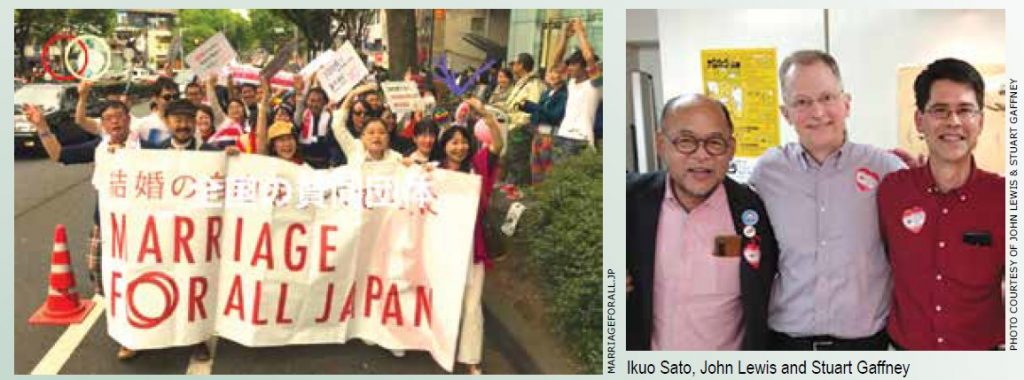
By Stuart Gaffney and John Lewis–
When we were first invited to Japan to speak about marriage equality and LGBTIQ rights seven years ago, we asked those in attendance at our talk to raise their hands if they knew a gay person. No one did. Japan not only did not have marriage equality, but also not even a single locale had passed any form of same-sex partnership recognition.
Last week, a court in Sapporo, Japan, declared that the nation’s exclusion of LGBTIQ couples from marriage is unconstitutional. The court did so in one of a coordinated set of lawsuits brought by queer couples across the country. One of the plaintiffs, Ryosuke Kunimi, said that after learning of the ruling he simply “could not stop crying.” It reminded us of the joy we felt when the trial court ruled in our favor back in 2005 in the California marriage cases.
Recognizing that sexual orientation is immutable, the Sapporo court held that barring same-sex couples from marriage was discrimination forbidden by the Japanese Constitution. Plaintiffs believe the Sapporo decision will likely influence upcoming decisions in the other four lawsuits across the country expected later this year. Gon Matsunaka, director of the Marriage for All Japan coalition, characterized the importance of the Sapporo decision as “absolutely measureless.”
The decision will be appealed, however, and legal experts appear to believe that even with victory in the courts, Japan’s parliament will need to pass affirmative marriage equality legislation. The current conservative ruling party holds a strong majority in the Diet and has been resistant to change.
But the Sapporo decision could be a turning point, and the change we’ve witnessed in Japan over the last seven years gives us much hope. Last year, we were lucky enough to make a trip to Japan to speak in Tokyo, Osaka, Kobe, and Kyoto just before the COVID-19 worldwide lockdown. This time when we asked audience members at a university whether they personally knew a gay person, many hands shot into the air.
By the end of 2021, at least three Japanese prefectures (similar to states) and over ninety municipalities will be issuing partnership certificates to same-sex couples. Although the certificates have little legal significance, their symbolic importance is substantial and the sheer speed of enactment from zero to over ninety in less than seven years is unprecedented in Japan.
On our trip last year, we also had the honor of meeting some of the plaintiff couples and attorneys in the Japanese marriage equality cases when we gave joint presentations at LGBTIQ community centers in Tokyo and Osaka. One of those couples was Ikuo Sato and his partner. Connecting with these queer kindred spirits who live 6,000 miles away was electric.
Sato and his partner’s life journey reflects that of many Japanese gay people. When the case was originally filed, Sato described to the court and world the traumatic struggle he experienced being gay. Sato, a professional HIV educator, also explained that he was HIV-positive with additional serious medical conditions. He wanted to use his visibility in the lawsuit not only to achieve marriage equality but also to further HIV education in Japan. He told the court, “There would be no greater happiness than legally marrying my partner and becoming a couple in the real sense before I die.”

Strikingly, Sato’s partner was not by his side at the court, but sat anonymously in the audience because he had not come out either to his family or co-workers because of fear of discrimination. Risk of discrimination at the workplace and within families, schools, and the broader community remains a serious concern for many LGBTIQ Japanese. At the news conference, Sato read a statement from his partner, saying: “I really want to stay side-by-side with my partner, but can’t. I would like to win the suit, show my face in public, and end my legal battle with a smile.” Together, they hoped for a better life for themselves and for future generations.
One of the most frustrating aspects of civil rights advocacy is that the need for change is immediate, yet the undeniable reality is that changing laws, institutions, and public attitudes nearly always takes time. Tragically, Sato and his partner’s personal dream of equality for themselves will not come true. Sato died in January of this year.
We know Sato’s partner’s grief must be immense. But their motivation that their advocacy benefits not just themselves but also today’s youth and queer people not yet even born serves as an inspiration to us all. Indeed, we had barely been born when Frank Kameny’s fighting back against the so-called “Lavender Scare” decades ago commenced the modern movement for legal LGBTIQ equality in the U.S. The shared wish of many LGBTIQ activists that future generations not suffer the way we did has been instrumental to our successes and imbued the movement with generosity. The movement is about both now and the future.
The time we spent with Sato last year was magical, and Sato’s magic will benefit many to come. We hope that last week’s court decision in Sapporo marks a turning point for Japan that will emanate across other parts of Asia and beyond.
Stuart Gaffney and John Lewis, together for over three decades, were plaintiffs in the California case for equal marriage rights decided by the California Supreme Court in 2008. Their leadership in the grassroots organization Marriage Equality USA contributed in 2015 to making same-sex marriage legal nationwide.
Published on March 25, 2021
Recent Comments